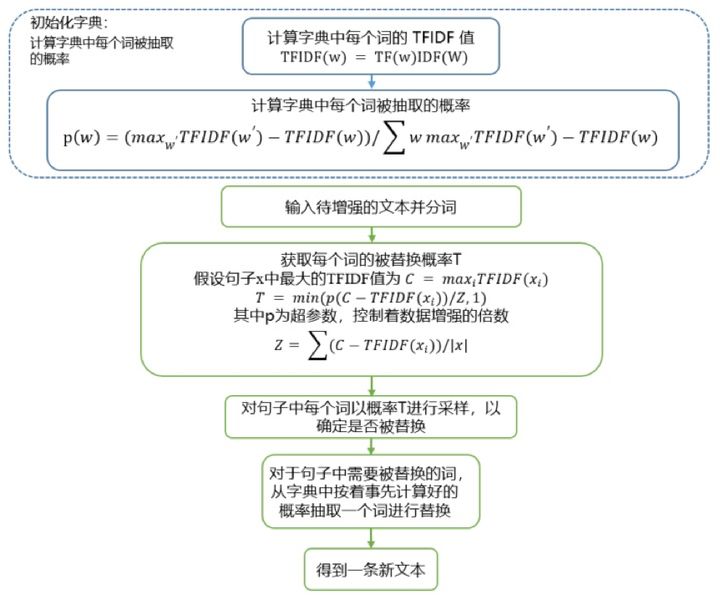2021SC@SDUSC
整个技术的核心点也比较简单,用词典中不重要的词去替换文本中一定比例的不重要词,从而产生新的文本。在无监督数据增强论文中。基本思想是,TF-IDF分数较低的单词是无意义的,因此可以替换而不会影响句子的真实标签。通过计算整个文档中单词的TF-IDF得分并取最低得分来选择替换原始单词的单词。
我们知道在信息检索中,一般会用 TF-IDF 值来衡量一个词对于一段文本的重要性,下面简单介绍一下 TF-IDF 的定义:
TF(词频)即一个词在文中出现的次数,统计出来就是词频 TF,显而易见,一个词在文章中出现很多次,那么这个词可能有着很大的作用,但如果这个词又经常出现在其他文档中,如「的」、「我」,那么其重要性就要大打折扣,后者就是用 IDF 来表征。
IDF(逆文档频率),一个重要性调整系数,衡量一个词是不是常见词。如果某个词比较少见,但是它在这篇文章中多次出现,那么它很可能就反映了这篇文章的特性,正是我们所需要的关键词。

?TF-IDF = TF×IDF,通过此公式可以有效衡量一个词对于一段文本的重要性。当我们知道一个词对于一个文本的重要性之后,再采用与 TF-IDF 负相关的概率去采样文中的词,用来决定是否要替换,这样可以有效避免将文本中的一些关键词进行错误替换或删除。
UDA 论文中所提出的具体实现方式如下:

TF-IDF分数较低的单词不能提供信息,因此可以在不影响句子的ground-truth的情况下替换/插入它们。
原始句子:The quick brown fox jumps over the lazy dog Tf-Idf替换:A quick brown fox jumps over the lazy dog Tf-Idf插入:sinks The quick brown fox jumps over the lazy Sidney dog
# coding=utf-8
# Copyright 2019 The Google UDA Team Authors.
#
# Licensed under the Apache License, Version 2.0 (the "License");
# you may not use this file except in compliance with the License.
# You may obtain a copy of the License at
#
# http://www.apache.org/licenses/LICENSE-2.0
#
# Unless required by applicable law or agreed to in writing, software
# distributed under the License is distributed on an "AS IS" BASIS,
# WITHOUT WARRANTIES OR CONDITIONS OF ANY KIND, either express or implied.
# See the License for the specific language governing permissions and
# limitations under the License.
"""Word level augmentations including Replace words with uniform random words or TF-IDF based word replacement.
"""
from __future__ import absolute_import
from __future__ import division
from __future__ import print_function
import collections
import copy
import json
import math
import string
from absl import flags
import numpy as np
import tensorflow as tf
FLAGS = flags.FLAGS
printable = set(string.printable)
def filter_unicode(st):
return "".join([c for c in st if c in printable])
class EfficientRandomGen(object):
"""A base class that generate multiple random numbers at the same time."""
def reset_random_prob(self):
"""Generate many random numbers at the same time and cache them."""
cache_len = 100000
self.random_prob_cache = np.random.random(size=(cache_len,))
self.random_prob_ptr = cache_len - 1
def get_random_prob(self):
"""Get a random number."""
value = self.random_prob_cache[self.random_prob_ptr]
self.random_prob_ptr -= 1
if self.random_prob_ptr == -1:
self.reset_random_prob()
return value
def get_random_token(self):
"""Get a random token."""
token = self.token_list[self.token_ptr]
self.token_ptr -= 1
if self.token_ptr == -1:
self.reset_token_list()
return token
class UnifRep(EfficientRandomGen):
"""Uniformly replace word with random words in the vocab."""
def __init__(self, token_prob, vocab):
self.token_prob = token_prob
self.vocab_size = len(vocab)
self.vocab = vocab
self.reset_token_list()
self.reset_random_prob()
def __call__(self, example):
example.word_list_a = self.replace_tokens(example.word_list_a)
if example.text_b:
example.word_list_b = self.replace_tokens(example.word_list_b)
return example
def replace_tokens(self, tokens):
"""Replace tokens randomly."""
if len(tokens) >= 3:
if np.random.random() < 0.001:
show_example = True
else:
show_example = False
if show_example:
tf.logging.info("before augment: {:s}".format(
filter_unicode(" ".join(tokens))))
for i in range(len(tokens)):
if self.get_random_prob() < self.token_prob:
tokens[i] = self.get_random_token()
if show_example:
tf.logging.info("after augment: {:s}".format(
filter_unicode(" ".join(tokens))))
return tokens
def reset_token_list(self):
"""Generate many random tokens at the same time and cache them."""
self.token_list = self.vocab.keys()
self.token_ptr = len(self.token_list) - 1
np.random.shuffle(self.token_list)
def get_data_stats(examples):
"""Compute the IDF score for each word. Then compute the TF-IDF score."""
word_doc_freq = collections.defaultdict(int)
# Compute IDF
for i in range(len(examples)):
cur_word_dict = {}
cur_sent = copy.deepcopy(examples[i].word_list_a)
if examples[i].text_b:
cur_sent += examples[i].word_list_b
for word in cur_sent:
cur_word_dict[word] = 1
for word in cur_word_dict:
word_doc_freq[word] += 1
idf = {}
for word in word_doc_freq:
idf[word] = math.log(len(examples) * 1. / word_doc_freq[word])
# Compute TF-IDF
tf_idf = {}
for i in range(len(examples)):
cur_word_dict = {}
cur_sent = copy.deepcopy(examples[i].word_list_a)
if examples[i].text_b:
cur_sent += examples[i].word_list_b
for word in cur_sent:
if word not in tf_idf:
tf_idf[word] = 0
tf_idf[word] += 1. / len(cur_sent) * idf[word]
return {
"idf": idf,
"tf_idf": tf_idf,
}
class TfIdfWordRep(EfficientRandomGen):
"""TF-IDF Based Word Replacement."""
def __init__(self, token_prob, data_stats):
super(TfIdfWordRep, self).__init__()
self.token_prob = token_prob
self.data_stats = data_stats
self.idf = data_stats["idf"]
self.tf_idf = data_stats["tf_idf"]
data_stats = copy.deepcopy(data_stats)
tf_idf_items = data_stats["tf_idf"].items()
tf_idf_items = sorted(tf_idf_items, key=lambda item: -item[1])
self.tf_idf_keys = []
self.tf_idf_values = []
for key, value in tf_idf_items:
self.tf_idf_keys += [key]
self.tf_idf_values += [value]
self.normalized_tf_idf = np.array(self.tf_idf_values)
self.normalized_tf_idf = (self.normalized_tf_idf.max()
- self.normalized_tf_idf)
self.normalized_tf_idf = (self.normalized_tf_idf
/ self.normalized_tf_idf.sum())
self.reset_token_list()
self.reset_random_prob()
def get_replace_prob(self, all_words):
"""Compute the probability of replacing tokens in a sentence."""
cur_tf_idf = collections.defaultdict(int)
for word in all_words:
cur_tf_idf[word] += 1. / len(all_words) * self.idf[word]
replace_prob = []
for word in all_words:
replace_prob += [cur_tf_idf[word]]
replace_prob = np.array(replace_prob)
replace_prob = np.max(replace_prob) - replace_prob
replace_prob = (replace_prob / replace_prob.sum() *
self.token_prob * len(all_words))
return replace_prob
def __call__(self, example):
if self.get_random_prob() < 0.001:
show_example = True
else:
show_example = False
all_words = copy.deepcopy(example.word_list_a)
if example.text_b:
all_words += example.word_list_b
if show_example:
tf.logging.info("before tf_idf_unif aug: {:s}".format(
filter_unicode(" ".join(all_words))))
replace_prob = self.get_replace_prob(all_words)
example.word_list_a = self.replace_tokens(
example.word_list_a,
replace_prob[:len(example.word_list_a)]
)
if example.text_b:
example.word_list_b = self.replace_tokens(
example.word_list_b,
replace_prob[len(example.word_list_a):]
)
if show_example:
all_words = copy.deepcopy(example.word_list_a)
if example.text_b:
all_words += example.word_list_b
tf.logging.info("after tf_idf_unif aug: {:s}".format(
filter_unicode(" ".join(all_words))))
return example
def replace_tokens(self, word_list, replace_prob):
"""Replace tokens in a sentence."""
for i in range(len(word_list)):
if self.get_random_prob() < replace_prob[i]:
word_list[i] = self.get_random_token()
return word_list
def reset_token_list(self):
cache_len = len(self.tf_idf_keys)
token_list_idx = np.random.choice(
cache_len, (cache_len,), p=self.normalized_tf_idf)
self.token_list = []
for idx in token_list_idx:
self.token_list += [self.tf_idf_keys[idx]]
self.token_ptr = len(self.token_list) - 1
tf.logging.info("sampled token list: {:s}".format(
filter_unicode(" ".join(self.token_list))))
def word_level_augment(
examples, aug_ops, vocab, data_stats):
"""Word level augmentations. Used before augmentation."""
if aug_ops:
if aug_ops.startswith("unif"):
tf.logging.info("\n>>Using augmentation {}".format(aug_ops))
token_prob = float(aug_ops.split("-")[1])
op = UnifRep(token_prob, vocab)
for i in range(len(examples)):
examples[i] = op(examples[i])
elif aug_ops.startswith("tf_idf"):
tf.logging.info("\n>>Using augmentation {}".format(aug_ops))
token_prob = float(aug_ops.split("-")[1])
op = TfIdfWordRep(token_prob, data_stats)
for i in range(len(examples)):
examples[i] = op(examples[i])
return